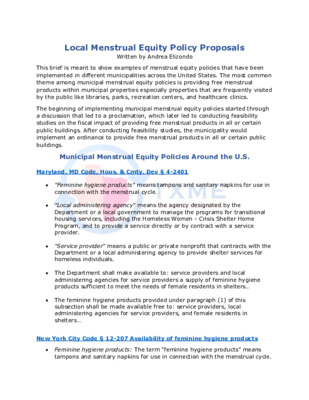Item 2a - Working Group Updates Local Menstrual Equity Policy Proposals — original pdf
Backup

Local Menstrual Equity Policy Proposals Written by Andrea Elizondo This brief is meant to show examples of menstrual equity policies that have been implemented in different municipalities across the United States. The most common theme among municipal menstrual equity policies is providing free menstrual products within municipal properties especially properties that are frequently visited by the public like libraries, parks, recreation centers, and healthcare clinics. The beginning of implementing municipal menstrual equity policies started through a discussion that led to a proclamation, which later led to conducting feasibility studies on the fiscal impact of providing free menstrual products in all or certain public buildings. After conducting feasibility studies, the municipality would implement an ordinance to provide free menstrual products in all or certain public buildings. Municipal Menstrual Equity Policies Around the U.S. Maryland. MD Code, Hous. & Cmty. Dev § 4-2401 "Feminine hygiene products" means tampons and sanitary napkins for use in connection with the menstrual cycle. "Local administering agency" means the agency designated by the Department or a local government to manage the programs for transitional housing services, including the Homeless Women - Crisis Shelter Home Program, and to provide a service directly or by contract with a service provider. "Service provider" means a public or private nonprofit that contracts with the Department or a local administering agency to provide shelter services for homeless individuals. The Department shall make available to: service providers and local administering agencies for service providers a supply of feminine hygiene products sufficient to meet the needs of female residents in shelters… The feminine hygiene products provided under paragraph (1) of this subsection shall be made available free to: service providers, local administering agencies for service providers, and female residents in shelters… New York City Code § 12-207 Availability of feminine hygiene products Feminine hygiene products: The term “feminine hygiene products” means tampons and sanitary napkins for use in connection with the menstrual cycle. Temporary shelters: The term “temporary shelters” means department of homeless services family with children shelters, adult family shelters, single adult women shelters and single adult men shelters; and human resources administration domestic violence shelters and HIV/AIDS services administration (HASA) shelters. The department of citywide administrative services shall make available to agencies operating or having oversight of providers operating temporary shelters a supply of feminine hygiene products sufficient to meet the needs of residents. The department shall also make available a supply of feminine hygiene products sufficient to meet the needs of youth in secure detention facilities operated by the administration for children’s services, as well as youth in congregate care facilities operated by the administration for children’s services who are awaiting placement with a licensed foster care agency. City of Boston City Council – An Order for a Hearing on Menstrual Equity in the City of Boston It is written as a proclamation. “WHEREAS: The City of Boston should increase access to menstrual products to help all students and residents fully in our City without facing barriers caused by poverty; THEREFORE BE IT” “ORDERED: That the appropriate committee of the Boston City Council hold a hearing on the feasibility of incorporating the provision of free menstrual products into Boston Public Schools, Boston Public Libraries, BCYF Community Centers, and the City of Boston.” Town of Brookline (MA) – Article 20 & Background Info The first municipality in the U.S. to provide free menstrual products in public buildings. Article 20 was written by Brookline High School students. Public buildings that should be prioritize providing free menstrual products: Town Hall, the Public Health building, Public Safety building, public libraries, and recreational facilities. Cost: “The most substantial cost of the by-law is the purchase and installation of dispensing machines in our public bathrooms. For that reason, the by-law has an effective date that will allow a phase-in across multiple fiscal years. Installation can be done by existing Town building staff, so the budget impact is principally the machine costs. Once machines are installed, bulk ordered supplies are far less expensive than typical retail and will be Homelessness included in the budget for toilet paper, paper towel, and other products already provided in public restrooms.” Menstrual Equity Policies Ideas for the City of Austin Provide free menstrual products available in showers and bathrooms accessible to people experiencing homelessness. o The bathrooms and showers listed in the COA COVID-19 Basic Needs Map can have menstrual products. o Use the partnership with The Other Ones Foundation (TOOF) to extend their hygiene services to include menstrual products. Provide emergency period care kits for people experiencing homelessness through the Homeless Outreach Street Team (HOST) and Austin Public Health facilities. Make sure the Austin Shelter for Women and Children (ASWC) has a steady supply of menstrual products. Jail and Correctional Facilities Partner with Travis County Jail to make menstrual products free and accessible in local jails. o Eliminate the limit on the number of menstrual products per individual. o Eliminate the disciplinary infraction for “trafficking and trading” for sharing menstrual products. Public Health Provide free menstrual products in Austin Public Health facilities like the Neighborhood Centers and Sexual Health Clinic. Provide period care kits through the Mobile Van Program from the Health Equity Unit. Provide educational programming and awareness (ex: brochures) about menstruation and menstrual disorders. Provide a reference list of Obstetricians and Gynecologist that accept indigent clients. Public Libraries menstrual disorders. Parks and Recreation summer camps. Provide free menstrual products in all libraries. Make sure there is a decent book inventory about menstruation and Provide free menstrual products in all community recreation centers and